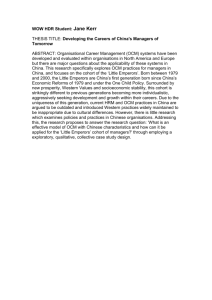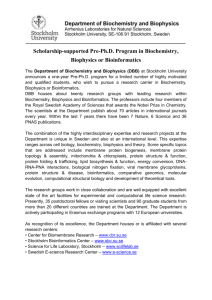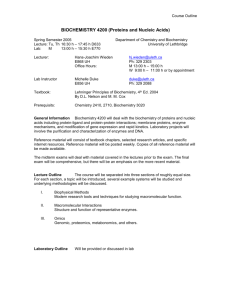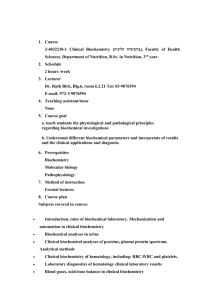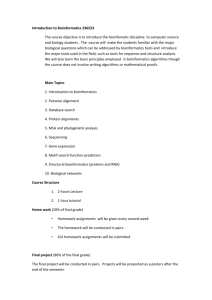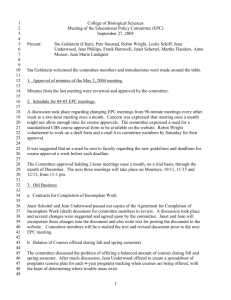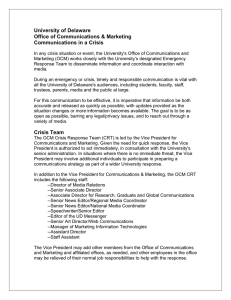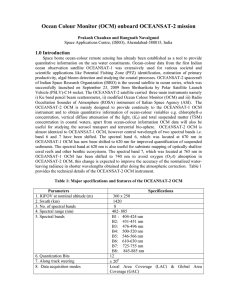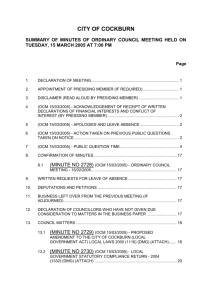01-23-09 - College of Biological Sciences
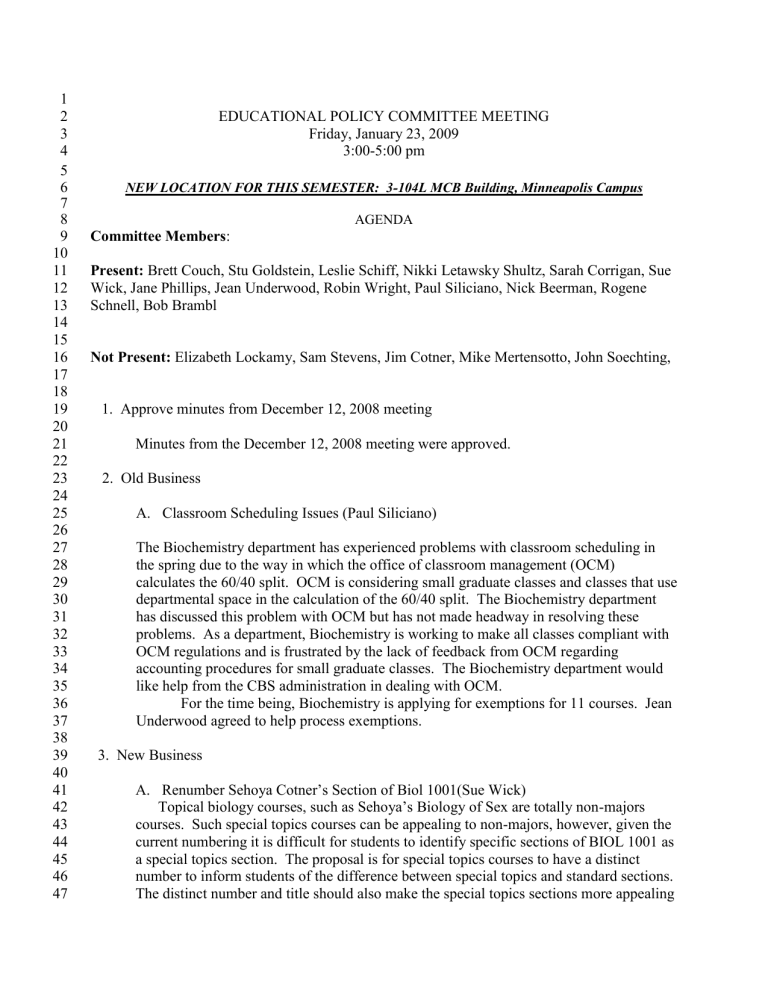
30
31
32
33
34
35
26
27
28
29
36
37
38
39
40
41
42
43
44
45
46
47
13
14
15
16
17
18
5
6
7
8
9
10
11
12
19
20
21
22
23
24
25
1
2
3
4
EDUCATIONAL POLICY COMMITTEE MEETING
Friday, January 23, 2009
3:00-5:00 pm
NEW LOCATION FOR THIS SEMESTER: 3-104L MCB Building, Minneapolis Campus
AGENDA
Committee Members :
Present: Brett Couch, Stu Goldstein, Leslie Schiff, Nikki Letawsky Shultz, Sarah Corrigan, Sue
Wick, Jane Phillips, Jean Underwood, Robin Wright, Paul Siliciano, Nick Beerman, Rogene
Schnell, Bob Brambl
Not Present: Elizabeth Lockamy, Sam Stevens, Jim Cotner, Mike Mertensotto, John Soechting,
1. Approve minutes from December 12, 2008 meeting
Minutes from the December 12, 2008 meeting were approved.
2. Old Business
A.
Classroom Scheduling Issues (Paul Siliciano)
The Biochemistry department has experienced problems with classroom scheduling in the spring due to the way in which the office of classroom management (OCM) calculates the 60/40 split. OCM is considering small graduate classes and classes that use departmental space in the calculation of the 60/40 split. The Biochemistry department has discussed this problem with OCM but has not made headway in resolving these problems. As a department, Biochemistry is working to make all classes compliant with
OCM regulations and is frustrated by the lack of feedback from OCM regarding accounting procedures for small graduate classes. The Biochemistry department would like help from the CBS administration in dealing with OCM.
For the time being, Biochemistry is applying for exemptions for 11 courses. Jean
Underwood agreed to help process exemptions.
3. New Business
A.
Renumber Sehoya Cotner’s Section of Biol 1001(Sue Wick)
Topical biology courses, such as Sehoya’s Biology of Sex are totally non-majors courses. Such special topics courses can be appealing to non-majors, however, given the current numbering it is difficult for students to identify specific sections of BIOL 1001 as a special topics section. The proposal is for special topics courses to have a distinct number to inform students of the difference between special topics and standard sections.
The distinct number and title should also make the special topics sections more appealing
26
27
28
29
30
31
22
23
24
25
32
33
34
35
15
16
17
18
19
20
21
36
37
38
39
40
41
42
43
44
45
46
5
6
7
8
1
2
3
4
9
10
11
12
13
14 to non-majors and inform them of how a section is different. These courses are commonly used by students as liberal education requirements. CLE approval of courses for fulfilling liberal education requirement requires that there are not separate “versions” of the same course but that courses are stand-alone. As a result, to get CLE approval for special topics sections, these sections need real course designators.
The EPC can formally approve number change for Sehoya’s special topics section of
BIOL1001. Since the course is different enough to require a new number, the EPC should do a formal approval for the course before giving it a new number. Number change should take effect fall 2010. CLE will then need to approve the LE designation
B.
Proposal for Cell Physiology ANSC/BIOL/PHSL/4xxx/5xxx (Sue Wick)
The proposal for the Cell Physiology course is a rough draft at this stage and was
Melissa Palmer’s first course proposal. The major criticisms of the EPC were: the double numbering of the course and designators for three different colleges.
The EPC would like Melissa to return with a proposal for just the 4000 level course for next meeting and would like her to consider a change to the course title from Cell Physiology to Mammalian Cell Physiology.
C.
New Biochemistry Course BioC 1010 (Paul Siliciano)
This course would be a niche course aimed at students from across the university who are interested in issues of human health such as differences between healthy and diseased states, molecular mechanisms of disease treatment. The novelty of this course is that it would not require a chemistry prerequisite. The required chemistry would be taught as part of the course. This model is aimed at bringing in students from outside CBS that would not consider biochemistry courses due to the requirement for a chemistry prerequisite. This course would not meet any CLE requirements; in order to meet CLE criteria, the course would need to diverge significantly from its objectives. The course would appeal to students that are interested in diseases such as diabetes and high blood pressure as a result of personal experience such as relatives with these conditions.
The EPC will vote on the course proposal at the next meeting.
D. Allow Bioinformatics Courses to Count as Labs? (Nikki & Stu)
Dave Matthes is teaching a bioinformatics course wants the EPC to consider giving students credit for this as a lab course after a student who wanted to receive lab credit for the course approached him. Bioinformatics is becoming a mainstream technique and in principal should bioinformatics be considered lab courses. The EPC would want to review the syllabus to make sure that the way in which assignments are structured; assignments would need to be somewhat open ended rather than simply following cookbook style protocols and requires real inquiry (hypothesis testing or observational science).
The point was raised, rather than thinking about the appropriateness of
Bioinformatics as a lab course, the committee should consider what this course would be
9
10
11
5
6
7
8
1
2
3
4
12
13
14
15 like if it was lecture only; it would be totally unsuccessful. By nature, teaching this topic requires laboratory style inquiry and exploration of methods.
4. Announcements
Faculty in CBS will be receiving an invitation to fill out a writing enriched curriculum survey online. To make this project successful, all faculty in CBS encouraged to fill out a survey.
The Undergrad Curriculum Committee is performing an internal review. The group has met once and will begin meeting weekly starting next week. Kate VandenBosch (Plant
Biology) and Scott Lanyon (EEB) are helping with the restructuring of biology majors by proposing the creation of a departmental home for the biology majors. This has been the informal role of plant biology. Formalization of this role would help with mentoring and give a single group ownership and responsibility for the major.
